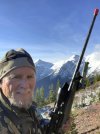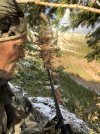Bucklowery
Well-Known Member
First time to Rockies this year I knew it was going to be tough coming from Florida at sea level. Get in all the workout you can especially with your pack and work those quads. Just wearing a pack for 8 hours a day can wear on you if you are not use to it. We drove and left early a couple days early. I started hydration before we left. Nothing but water for three days and all me and the wife could drink on the way out there. I took this advice and think it made the difference during the 6 day hunt. I thought I done ok for a flatlander, I was toast at the end of each day but recovered well and night and started fresh the next day. My guide was part billy goat cause he showed me where they hangout. He was 28 years younger but he toughened me up that week
Thanks
Buck
Thanks
Buck


